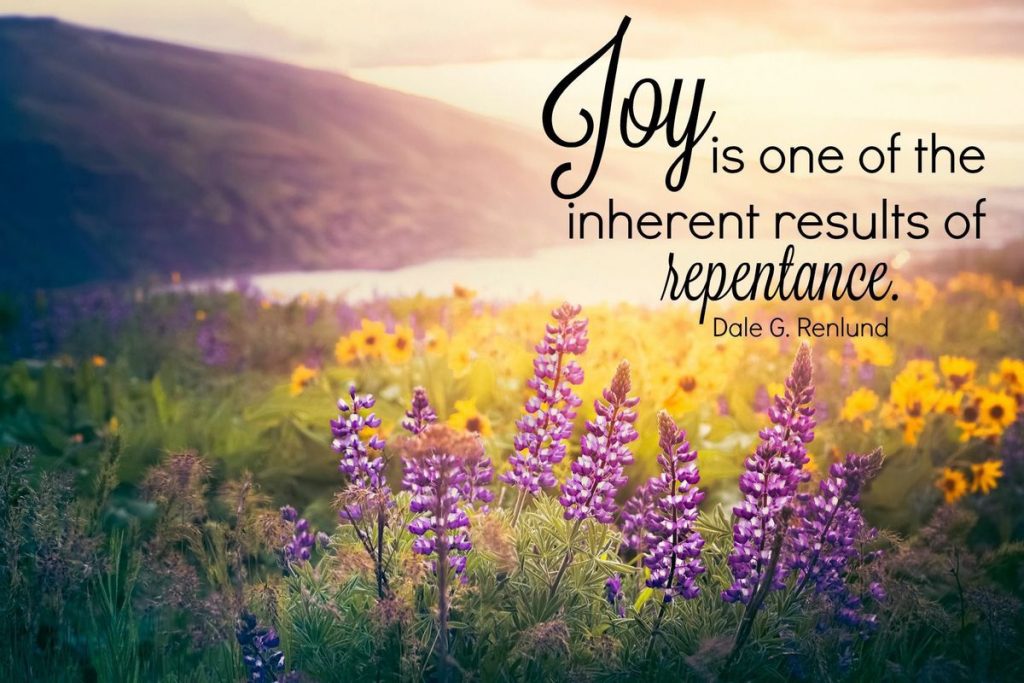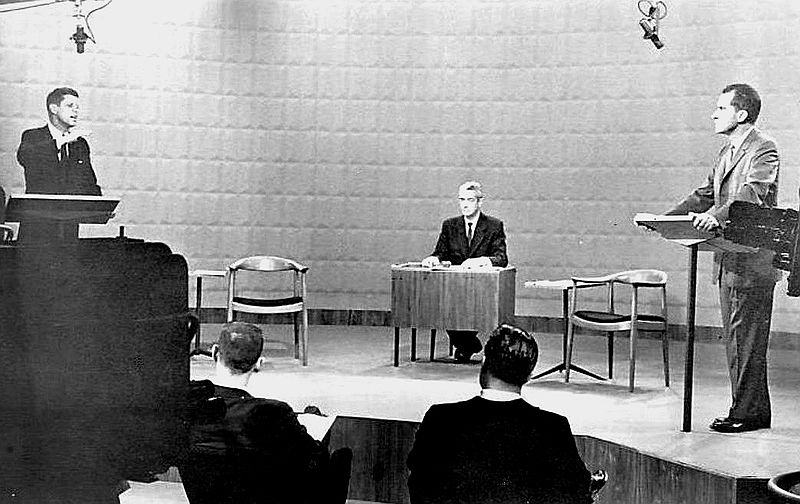This post is a talk that I gave in my congregation a couple of weeks ago. A few folks asked me for copies, so I thought putting it online would be the simplest approach.
Love or Fear
I have heard it said that every decision a human makes fundamentally comes down to one of only two motivations: fear or love. That’s it.
Scientists are a little less romantic about it, but they actually have the same basic concept. From biology to computer science whether you’re talking about an amoeba or an artificial intelligence the fundamental choice every agent has to make comes down to attraction or avoidance. You are attracted to the good stuff. You avoid the bad stuff. If you’re a bacterium, it means you move towards food and you move away from anything that thinks your food. So these are the two motives any creature can have: we either move towards what we want or we move away from what we don’t want.
An Irritant or a Quest
President Benson said
When obedience ceases to be an irritant and becomes our quest, in that moment God will endow us with power. [ref]via Elder Donald L. Staheli in Obedience—Life’s Great Challenge[/ref]
What I want to talk about is how we make that transition. How do we change our attitude towards obedience? How do move beyond the place where obedience feels like a burden and get to the place where obedience feels like a challenge? How do we turn obedience from an irritant into a quest?
I believe that it comes down to fear and love. We have to wean ourselves away from fear-based obedience and towards love-based obedience. We have to fear less and love more. It’s like Paul told Timothy:
For God hath not given us the spirit of fear; but of power, and of love, and of a sound mind.[ref]2 Timothy 1:7[/ref]
Fearful Obedience
On my mission I set goals all the time. My companion and I would sit down, we’d pray, and we’d set “realistic” goals. We’d set goals that—sitting in the apartment, feeling charged to go out and do the Lord’s work—seemed easily attainable.
I don’t think we hit 50% of our weekly goals a single time. Not even once. And yet somehow, we never learned. Every week we felt really horrible about how bad our goals were going, and every week we rallied and we did the exact same thing.
The Lord can work with all kinds of tools, but I’m pretty sure that even he appreciates the value of a sharp instrument over a blunt one. As a missionary I was definitely not the sharpest tool in the shed. It never occurred to me, not even once, that the only realistic goals would be to start with what we actually accomplished last week and then build from there.
It’s not actually that I was too dumb. The truth is that I was too proud to admit how far from perfect I was. I wanted to think of myself as a good missionary. I’d wanted to serve my whole life, I was following the rules, and I truly wanted to be there. So I just assumed—naturally—given all my good intentions I had to be pretty good, right?
Well, not. First of all, that’s not realistic. That’s just wishful thinking. I try to be a lot more realistic now than I was then. (My wife doesn’t think I’m very good at that, yet.) More importantly, however, I was operating out of fear. It was fear-based obedience. I was afraid of failure. And, I have come to learn, there is a mile of difference between trying to avoid failure and pursuing success. They may look similar from the outside, but from the inside they could not be more opposite.
Trying to be obedient out of fear means that you’re in constant stress. You’re unwilling to take risks—and risks are necessary for growth. Over time, this can lead to shriveling and atrophy. You remember the parable of the talents? The rich man gives his servants 5 talents, 2 talents, and 1 talent. The story has always bugged me, because it’s the poor guy who only gets 1 talent that messes it up. I’d like the story more if it was the guy who got 5 talents who was lazy. But that’s not the point. The point is that the first two invested. They risked. They turned doubled their talents. But the last guy? He was so afraid of losing his talent he just buried it. That’s fear right there.
Still Better than Disobedience
Let me pause for a second and make a very important disclaimer. Fear-based obedience is not as good as love-based obedience, but it’s still a whole lot better than disobedience. I don’t want anybody misunderstanding me on that point, OK?
And there’s a reason for that.
The laws of nature, the laws of God, the laws of life, are one and the same and are always in full force.[ref]Elder Richard L. Evans Where Are You Really Going?[/ref]
No matter why you are obedient, you’re still going to enjoy at least some of the blessings of that obedience because the laws of God are always in full force. The laws of physics don’t care why you buckle your seat-belt, right? If you get into an accident, your motivation does not enter into the equation. If you have the seat-belt on, you’re going to be safe. If you have it off, you’re going to be in a lot more danger.
O my beloved young friends, even selfishly it is smart to keep the commandments God has given.[ref]lder Richard L. Evans Where Are You Really Going?[/ref]
So, step 1 is be obedient. What we’re talking about now is step 2, which is how to be obedient.
Look, if your option is to either be obedient because you feel like you’re supposed to or be disobedient, then go ahead: be obedience out of obligation. When I was growing up I avoided a lot of pitfalls because I was afraid. That’s the honest truth. I didn’t smoke, I didn’t drink, I didn’t watch pornography. It’s not because I’m such an awesome, righteous guy. It’s because I was risk averse. I saw that a lot of bad stuff came along with drinking and smoking, and in general I never wanted to lose control. I was obedient because I was afraid. That’s better than disobedient. And there are plenty of days when I just don’t feel all excited about following the commandments, and I just go through the motions because it’s what I promised to do. Going through the motions is better than not doing it at all.
So, fearful obedience is better than disobedience, but it’s not that great. We want love-based obedience. This is tricky, in a way, because we’re changing horses in mid-stream. We need to find a way out of fear-based obedience and into love-based obedience. Let’s start with letting go of fear.
A Remission of Sins
I have always been struck by the phrase “remission of sins.” We pretty much always hear about it around baptism.
John did baptize in the wilderness, and preach the baptism of repentance for the remission of sins.[ref]Mark 1:4, emphasis added[/ref]
And the only other time we ever use the word “remission” is when we’re talking about cancer. I’m not a scholar. I know that the word remission has two definitions. It can mean “the cancellation of a debt” or it can mean “a temporary recovery.” And I’m not certain which one fits best with our understanding of baptism. But as I understand it, the idea of cancer going into remission and the idea of sins going into remission is basically the same. The one difference is this: when your cancer goes into remission you can’t control if or when it will come back. But when your sins go into remission you are in control. As long as you abide by the covenant you made when you were baptized, they are in remission.
What this means to me is: you don’t have to be afraid. You don’t have to live in fear. When you have faith in Christ, you get to live in hope.
That’s the first key to transitioning away from fear-based obedience.
Humility
The second key is being humble. That was my biggest problem as a goal-setting missionary. I was too proud to admit how weak I was. That got a lot easier as I got older. My life, in many ways, has been a string of disastrous failures ever since I got home from my mission. I have failed at so many things and in so many ways and with such utter gracelessness that I have been blessed with the inability to take myself very seriously anymore. I am like the poor Zoramites who were not allowed into the synagogues that they had built.
because ye are compelled to be humble blessed are ye[ref]Alma 32:13[/ref]
This humiliation has been a great blessing. It has taught me that fear of your own sins is a kind of arrogance. It is like saying that your evil is greater than Christ’s good. It is like saying that you have the ability to dig a hole too deep for your Savior to lift you out of. And if there’s only one thing you remember from my talk, let it be this: as long as you want to be saved there are no holes that deep.
When you are humble, failure loses the power to intimidate you. That’s why the devil hates humble people, they are practically impossible to push around. When you have faith and are humble, you are ready to let go of fear.
Godly Ambition
I’m going to share one of my favorite quotes. It’s from a man named Ira Glass, and—on the surface, at least—it won’t sound very religious. But it is. You’ll see. Here is his quote:
Nobody tells this to people who are beginners, I wish someone told me. All of us who do creative work, we get into it because we have good taste. But there is this gap. For the first couple years you make stuff, it’s just not that good. It’s trying to be good, it has potential, but it’s not. But your taste, the thing that got you into the game, is still killer. And your taste is why your work disappoints you. A lot of people never get past this phase, they quit. Most people I know who do interesting, creative work went through years of this. We know our work doesn’t have this special thing that we want it to have. We all go through this. And if you are just starting out or you are still in this phase, you gotta know its normal and the most important thing you can do is do a lot of work. Put yourself on a deadline so that every week you will finish one story. It is only by going through a volume of work that you will close that gap, and your work will be as good as your ambitions. And I took longer to figure out how to do this than anyone I’ve ever met. It’s gonna take awhile. It’s normal to take awhile. You’ve just gotta fight your way through.[ref]The quote is all over the place. The most original source I could find was YouTube.[/ref]
This quote is about love and fear. All artists have to confront the gap between what they want to do (make good art) and what they are doing (making terrible art) and then they have to make a decision: love or fear. If they choose fear, they will quit, because the pain of failure is too much. If they choose love, they will refuse to give up. And that means they will keep on failing. They will write bad stories. They will write terrible poetry. They will take horrible photographs. And they will do it again and again and again until they get it right.
This applies to all of us.
Every thing which inviteth to do good, and to persuade to believe in Christ, is sent forth by the power and gift of Christ[ref]Moroni 7:16[/ref]
We all see light and truth and kindness and beauty in our lives at some point. We love those things. And we all see our own actions and we see darkness and deception, selfishness and ugliness. And then we have to choose: love or fear.
If we choose love, then—just like the artists—we go right on ahead and keep failing. We fail at being perfectly kind. We fail at being perfectly wise. We fail at being perfectly honest. And every morning we get up and we do it again and again until one day we get it right. And that is what it means to be a saint.
A saint is not necessarily a person who is perfect, but he is a person who strives for perfection—one who tries to overcome those faults and failings which take him away from God. A true saint will seek to change his manner of living to conform more closely to the ways of the Lord.[ref]Elder Theodore M. Burton in The Need for Total Commitment[/ref]
Artists learn to be better artists by first being bad artists. They practice. And people learn to be better people by first being bad people. They practice. And the name for that practice is: obedience. When you “seek to change [your] manner of living to conform more closely to the ways of the Lord” because you love the things which “inviteth to do good” then—for you—obedience has become a quest. Keeping the commandments will always be hard, but it will no longer feel like a burden because you will understand that keeping the commandments is the path to becoming the kind of person you would be proud to be.
—
If you’d like a printable copy of the talk, here you go.

 Philosopher Joseph M. Spencer has already made some
Philosopher Joseph M. Spencer has already made some 




